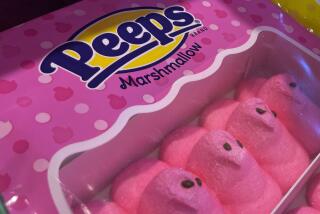Diaper Maker Changes ‘Green Marketing’ Claims : Advertising: The manufacturer of Bunnies agrees to redesign the product and alter descriptions of its environmental benefits after being challenged by a 10-state task force.
- Share via
PLACENTIA — Yielding to pressure against its allegedly deceptive “green marketing” strategy, the maker of Bunnies biodegradable disposable diapers said Wednesday that it has agreed to tone down claims that the product benefits the environment.
American Enviro Products of Placentia entered into the agreement following a probe of the environmental claims by a group of attorneys general in 10 states, including California, on behalf of consumers.
The company agreed to redesign its diapers and packaging, and pay $50,000 in settlement costs--$5,000 to each of the 10 states. The company admitted no wrongdoing in making the settlement.
“This shows that companies can make responsible environmental claims but should not make a misleading claim,” said Al Shelden, a California supervising deputy attorney general in San Diego.
He noted that the agreement was the first major action taken as a result of investigations by the “multi-state task force on ‘green advertising.’ ”
Green advertising or marketing refers to the manufacturers’ claims that a product is environmentally safe, considered an attractive selling point at a time when consumers are believed to have an unprecedented concern about clean air, water and soil, and such issues as global warming.
American Enviro raised the ire of competitors and state consumer officials, led by New York Atty. Gen. Robert Abrams, with claims that its diapers are made of a “revolutionary outer backing” that biodegrades in three to five years.
“Bunnies and the plastic bag they are sold in will biodegrade before your child grows up,” the company stated.
The attorneys general, however, alleged that diapers cannot biodegrade when sealed in a landfill.
“We believe it was misleading,” Shelden said, “both in terms of the amount of years it would take for the product to degrade and the implied representations that this (product) would help solve the landfill problem.”
Under the agreement, the company will replace its Bunnies product with a reformulated one called Bunnies Plus. The new diaper will have a cotton core and is thinner than its previous product, which used wood pulp for absorbency.
The company has agreed to move the biodegradable claims for Bunnies Plus to the side of the package. There, the new package explains that the diapers will break down if composted rather than dumped in a landfill.
“The settlement was amicable at a minimum cost to us, and we’re putting out a much better product,” said Robert Chickering, founder and president of American Enviro. “We have tons of research showing the benefits of biodegradability in a landfill, but we were not able to convince them of that.”
The company sold 1.5 million diapers since introducing Bunnies in supermarkets in July, 1989. Sales reached $18 million during the year ending June 30, Chickering said, and he said he expected sales for the next year would reach $40 million.
The company’s giant competitors--Proctor & Gamble Co., which makes Pampers and Luvs, and Kimberly-Clark Corp., which makes Huggies--had claimed that there was no basis for the “biodegradable” claim. The two companies control more than 80 percent of the $3.5-billion disposable-diaper market.
“We’re glad to see that there is a growing acceptance of the view that biodegradability is not a practical solution to the solid-waste problem,” Kimberly-Clark spokeswoman Jean Allen said.
Several other small companies--Dandees Enterprises, RMED International (TenderCare) and Dafoe & Dafoe Inc. (Nappies)--have used the biodegradable tag to help further sales.
New York and California attorneys general were joined in the move against the company by their counterparts in Florida, Massachusetts, Minnesota, Missouri, Texas, Utah, Washington and Wisconsin.
Times staff writer Dean Takahashi contributed to this article.
More to Read
Inside the business of entertainment
The Wide Shot brings you news, analysis and insights on everything from streaming wars to production — and what it all means for the future.
You may occasionally receive promotional content from the Los Angeles Times.










